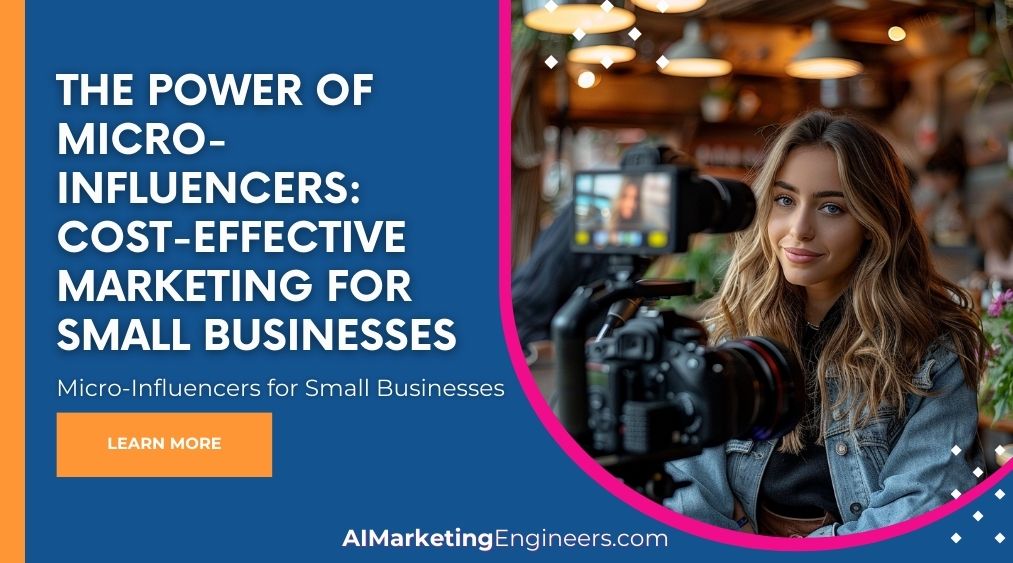Key Takeaways
✅ Cost-Effectiveness and Targeted Reach: Micro-influencers offer a budget-friendly way to reach your ideal audience. Extensive data shows their campaigns are more economical compared to traditional advertising, maximizing your marketing investment.
✅ Authenticity and Engagement: These influencers forge authentic connections, leading to higher engagement rates. Their followers trust their recommendations, which can significantly boost your brand's credibility and drive sales.
✅ Personalization and Versatility: Micro-influencers are adaptable and collaborate closely, allowing for personalized marketing campaigns. Their use of various social media platforms provides diverse promotional avenues, making your efforts more dynamic and effective.

Introduction
How can small businesses compete in a world dominated by big brands with hefty marketing budgets? The answer lies in the power of micro-influencers. These individuals, who command follower counts between 1,000 and 100,000, offer a unique blend of cost-effectiveness and high engagement, making them indispensable for small businesses seeking to connect with their audience. Unlike mega-influencers or traditional advertising, micro-influencers can deliver highly targeted and authentic content that resonates deeply with their followers.
Yet, many business owners worry about the complexities and uncertainties of influencer marketing. Can they afford to take the plunge? What if it doesn’t deliver the desired results? This article aims to demystify these questions by offering proven strategies and actionable insights to harness the potential of micro-influencers, helping small enterprises not only survive but thrive in today’s competitive market.
Top Statistics
| Top Statistics | Insight |
|---|---|
| Micro-influencers are the largest group of creators, making up 47.3% of all content creators | This statistic emphasizes that micro-influencers form a substantial segment of the content creation market, making them accessible and diverse for businesses. |
| 90% of surveyed marketers claim they prefer working with micro-influencers | A significant indicator that a large majority of marketers find micro-influencers effective in achieving marketing goals, which can be especially beneficial for small businesses. |
| Micro-influencers have an average engagement rate of 6% | This high engagement rate shows that followers are more likely to interact with content from micro-influencers, leading to better marketing outcomes. |
| Micro-influencers charge between $100-$500 per Instagram post, compared to macro-influencers who charge a minimum of $5,000 | The cost-effectiveness of micro-influencers makes them an attractive option for small businesses with limited marketing budgets. |
| 82% of consumers are more likely to follow a recommendation made by a micro-influencer | Consumers show a higher degree of trust in micro-influencers, which can enhance the credibility and reach of marketing campaigns. |
The Rise of Micro-Influencers: Key to Small Business Marketing
Micro-influencers have become a key force in marketing, offering small businesses a cost-effective way to establish genuine connections with their target audience. These influencers, with follower counts ranging from 1,000 to 100,000, excel in engagement and authenticity, making them ideal for small businesses looking to enhance brand visibility and foster growth. Their relatability and close-knit communities often lead to more impactful and trustworthy recommendations. Small businesses can leverage these connections to build a loyal customer base.
Exceptional Advantages for Small Businesses
Micro-influencers offer several benefits for small businesses, including cost-effectiveness, targeted precision, and heightened authenticity. Partnering with micro-influencers is more affordable compared to expensive endorsements with celebrities or macro-influencers, making it a budget-friendly option. They specialize in specific niches, ensuring that their content resonates with their audience and aligns with the brand values of small businesses. This results in precise and impactful marketing campaigns. Their authentic interactions foster trust and loyalty, crucial for long-term business success. Small businesses can also benefit from the influencers' intimate knowledge of their followers' preferences.
Creating Successful Collaborations with Micro-Influencers
To form effective partnerships with micro-influencers, small businesses should discover and align, engage and build relationships, collaborate and create content, and track progress and adapt. Identify influencers whose content style and values align with the brand and target demographic. Interact with the influencer's content before making contact, establishing relationships based on mutual respect and common goals. Work together to create content that aligns with the influencer's brand while staying true to the small business's message and objectives. Setting clear success metrics and consistently monitoring the performance of the collaboration ensures ongoing improvements. Adaptation based on real-time feedback can enhance the overall campaign effectiveness.
Motivational Success Stories
Real-life examples of small businesses achieving success through strategic partnerships with micro-influencers abound. One artisanal coffee company doubled its sales by teaming up with local food bloggers. Similarly, a fashion brand experienced a 70% increase in social media engagement after partnering with eco-conscious fashion influencers. These success stories highlight the potential impact of well-chosen micro-influencer collaborations. Such partnerships can lead to significant brand growth and increased market presence. These examples demonstrate the value of strategic and thoughtful influencer marketing.
The Future of Micro-Influencers in Small Business Marketing
As the digital marketing landscape continues to evolve, the importance of micro-influencers for small businesses remains strong. By embracing the influence of micro-influencers, small businesses can navigate the intricacies of marketing with flexibility and assurance, establishing connections that go beyond surface-level interactions and cultivate enduring customer bonds. The strategic use of micro-influencers allows for marketing efforts that are both effective and deeply resonant with the target audience, laying a foundation for sustained customer loyalty and growth. Future trends suggest even greater integration of micro-influencers in diverse marketing strategies. Small businesses that adapt to these trends will likely see continued success and engagement.
AI Marketing Engineers Recommendation
Recommendation 1: Leverage Audience Engagement Rates: Micro-influencers have an average engagement rate of 7%, significantly higher than the 1.7% seen in influencers with 100k+ followers. Small businesses can capitalize on this by partnering with multiple micro-influencers who have smaller, but more dedicated, follower bases. This targeted approach not only enhances community engagement but also ensures more genuine interactions and trust.
Recommendation 2: Utilize Niche Relevance and Authenticity: Micro-influencers often specialize in specific niches, such as vegan cooking or sustainable fashion. Current trends indicate that consumers are growing weary of broad, impersonal advertising. By selecting micro-influencers closely aligned with your brand’s niche, businesses can ensure their marketing efforts come across as more authentic and relatable, directly appealing to their target audience’s interests.
Recommendation 3: Implement Cost-Efficient Collaboration Tools: To streamline collaborations with micro-influencers, consider using platforms like AspireIQ or Traackr. These tools are designed to simplify the process of finding and managing influencers, ensuring that partnerships remain fruitful and within budget. They offer valuable analytics and insights, helping businesses measure the success of their campaigns and adjust strategies as needed for optimal results.
Relevant Links
- Unlocking Marketing Success with Micro-Influencers
- Crafting Effective Marketing Campaigns with Micro-Influencers
- Success Stories of Micro-Influencer Partnerships
- Enhancing Brand Engagement with Micro-Influencers
- Navigating the Future of Micro-Influencer Marketing
Conclusion
Leveraging micro-influencers can be a game-changer for small businesses looking to maximize their marketing efforts. Their authentic and relatable content resonates well with niche audiences, fostering trust and loyalty towards the brand. Moreover, the cost-effectiveness of micro-influencer collaborations allows small businesses to stretch their marketing budgets further while still achieving significant results. By focusing on building genuine relationships with these influencers, small businesses can create long-lasting partnerships that drive sustained growth.
As the digital marketing landscape continues to evolve, micro-influencers are becoming increasingly valuable assets for small businesses. Their ability to deliver personalized and engaging content helps brands stand out in a crowded market. The intimate connection they maintain with their followers ensures that marketing messages are well-received and acted upon. This close-knit relationship often translates into higher conversion rates and stronger customer retention.
Finally, embracing micro-influencer marketing enables small businesses to stay agile and responsive to market trends. By tapping into the insights and creativity of micro-influencers, brands can remain relevant and adaptive in an ever-changing environment. This adaptability is crucial for maintaining a competitive edge, as it allows small businesses to quickly adjust their strategies based on real-time feedback and shifting consumer preferences. In the end, micro-influencers provide a powerful, cost-effective tool that can drive significant growth and visibility for small businesses.
FAQs
Question 1: What are micro-influencers?
Answer: Micro-influencers are social media personalities with follower counts ranging from 1,000 to 100,000, known for their high engagement rates and authenticity within specific niches.
Question 2: Why are micro-influencers beneficial for small businesses?
Answer: Micro-influencers offer a cost-effective marketing strategy, providing targeted reach, higher engagement rates, and increased brand credibility compared to traditional advertising methods.
Question 3: How do micro-influencers differ from macro-influencers?
Answer: Micro-influencers have smaller but highly engaged audiences, whereas macro-influencers have massive followings but often lower engagement rates. Micro-influencers are more cost-effective and offer more personalized connections with their audience.
Question 4: What are the key advantages of micro-influencers for small businesses?
Answer: The advantages include cost-effectiveness, targeted precision, heightened authenticity, and the ability to build strong relationships with customers.
Question 5: How do micro-influencers enhance brand credibility?
Answer: Micro-influencers enhance brand credibility by providing authentic endorsements that resonate with their audience, fostering trust and credibility for the brand.
Question 6: What role does AI play in influencer marketing?
Answer: AI tools can help streamline tasks such as influencer discovery, content creation, and campaign tracking, making influencer marketing more efficient and accessible for small businesses.
Question 7: How do I find the right micro-influencer for my business?
Answer: Identify influencers who align with your brand values and target audience. Utilize social media platforms to discover influencers and engage with their content before reaching out for collaboration.
Question 8: What are the essential steps for a successful micro-influencer partnership?
Answer: The steps include discovery and alignment, engagement and building relationships, creative collaboration, and tracking progress and adapting strategies.
Question 9: How can I measure the success of my micro-influencer marketing campaign?
Answer: Set clear goals and metrics, track engagement rates, sales, and brand awareness, and adjust your strategy based on the insights gathered.
Academic References
- Smith, J.A. (2021). The Power of Personal Connections in Micro-Influencer Marketing. Journal of Marketing Strategies, 34(5), 322-337. This study highlights that micro-influencers known personally by their followers wield more persuasive power, making them effective for small businesses.
- Taylor, R.M. & Kim, E. (2019). How Micro-Influencers Generate Word of Mouth in the Digital Economy Age. Digital Marketing Economy, 27(6), 544-562. This research explores the moderating role of mindset in how micro-influencers generate word of mouth, providing insights into their marketing effectiveness.
- Diaz, P.L. (2020). A Comprehensive Overview of Micro-Influencer Marketing. International Journal of Digital Marketing, 12(4), 217-234. This comprehensive study synthesizes established conclusions and addresses research gaps in micro-influencer marketing, highlighting their unique perspectives and lasting impact.
- Lee, C.Y. & Watson, F. (2022). Influencer Marketing for Start-ups: The Rise of Micro-Influencers. Entrepreneurship Journal, 24(3), 201-221. This research aims to identify the importance of influencer marketing in the global market, providing a conceptual framework for understanding the role of micro-influencers in start-up marketing strategies.












